Behind the title::
“Sinners” calls out the label historically used to shame Blackness, sensuality, queerness, survival, and sovereignty—especially through the lens of Christianity. It references the imposed guilt, the weaponized morality, the generational trauma of being told your instincts, your body, your music, your medicine, your very presence is sinful. But here, “Sinners” becomes a mirror term—a way to reflect how sin was never about evil, but separation. From land. From self. From source. It invites us to interrogate: What are we still separated from? And why?
“A Sensual Scripture” flips the idea of sacred text on its head. This is not a gospel of denial, but one of embodiment. It’s the kind of scripture that sweats. That moans. That remembers through rhythm. It honors the body as holy. It lifts up blues, rootwork, and storytelling as sacred literature. It says: Yes, this too is worship. It says: Let the hips be a hymn. Let the smoke be a sermon. Let the pleasure be prophetic.
“For the Stolen and the Sacred” names who it’s for— Those whose bodies, sounds, spirits, and stories have been stolen… and those who’ve remained sacred in spite of it. Or perhaps because of it. It’s for Black folk, Indigenous folk, queer folk, diasporic folk—anyone who’s ever had to protect what they know, while being watched, copied, demonized, and desired. It’s for the artists, the conjurers, the memory keepers. It’s for those who remember that even if they steal the fruit, the seed still belongs to you.
Yes… nearly 3 weeks later, I offer my dissertation-like Substack; written in a hybrid style that blends poetic prose, cultural criticism, spiritual exegesis, and ancestral memoir. It’s a frequency. A soft blade. A holy invitation.
Reading time: you decide….. take your time though.
This wasn’t just a vampire film. This was scripture with smoke in its lungs. This was Mississippi mud and memory made flesh. This was the sound of what gets buried clawing its way up through juke joint floorboards. This was a mirror—full length and unforgiving.
Ryan Coogler didn’t make a genre film. He offered a sermon stitched with history, hoodoo, heartbreak, and holy reckoning. A lesson in American haunting— And in the middle of it all— rooted, radiant, and ready— was Annie.
Annie, played with breath and bone by Wunmi Mosaku, was not merely a character. She was a triple conjure: Oya’s storm, Oshun’s sweetness, Yemaya’s depth. She carried smoke and root medicine like second skin. Her mojo bag wasn’t just for protection—it was a whole cosmology in cloth. A code of remembrance passed down by women who kept the South breathing through mourning veils and molasses. Annie was the Black South’s sacred technology—part mother, part mystic, part memory keeper.
But what if she wasn’t just herself?
What if Annie was the energetic embodiment of Zinzi Evans—Coogler’s real-life wife and creative collaborator in love and life—infused into Wunmi’s portrayal like a hidden offering?
And Smoke and Stack?
What if they were Coogler’s Gemini split?
His artist-self and his ancestral-self.
His Hollywood twin and his hoodoo twin.
One who knows how to build the machine.
One who remembers what the machine does to the people who made the music it runs on.
What if Sinners wasn’t just a film—but a confession?
What if Coogler is telling on himself in sacred code?
Exposing the paradox of being the conjurer and the commodity.
The vampire and the veve.
Because that’s the ache, right?
This current era, with its fame rituals and content ceremonies, ain’t so different from 1920s Delta Mississippi.
The jig might look like an awards show.
The juke joint might be a film set.
But the spirit of extraction still howls through the cotton fields and the red carpets alike.
He sees it.
He names it.
He offers it back to us in mirrors and monologues, blood and brilliance,
so we too can ask:
What part of myself is Smoke?
What part is Stack?
And who have I been feeding in order to stay seen?
And then there were the twins: Smoke and Stack. Whew. That wasn’t just clever—it was cosmological. They weren’t just brothers—they were mirrors. Ibeji. Duality. Gemini coded. They embodied the haunted brilliance of being both the watcher and the watched, the sacred and the commodified. One twin a trickster. The other a tender. One to lure, one to love. A smoky sermon in twin bodies, shape-shifting through Southern soil.
And Remmick? He was not just a villain. He was a lineage. A centuries-old manifestation of what happens when power divorces itself from root. He fled the Indigenous warning—those Native ancestors whose brief presence in the film was anything but minor. Their silence was thunder. Their warning was prophecy. They knew what was coming because it had already come.
Stolen land. Stolen bodies. Stolen sound.
Remmick moved like the echo of empire, luring the gifted and the grieving. His steps—Irish, jig-like—outside the juke joint weren’t accidental. They were coded in history. The Delta blues and Irish folk share old threads: both born of dispossession, both wailing songs of land and loss. Two colonized peoples with haunting rhythms and ghost-tongued lyrics. But where Black folks used the juke joint as a sacred break from the pulpit, Remmick used his banjo as a trap.
Shall we pause, to sip here?
…..let’s talk about this too—the Black church and the juke joint. Two sides of the same coin. The pulpit and the guitar. Saturday night hips and Sunday morning tongues.
Sacred and secular—split not by spirit, but by the need to control what couldn’t be contained.
But the truth? Both were portals. Both were medicine. Both were where we gathered our bones and remembered we were more than what was done to us.
Enter Sammy. Sammy was more than a musician—he was a gatekeeper. He lifted the veil through song. His music braided past, present, and prophecy. And that’s why Remmick wanted him. Not just his notes—but his knowing. Because Remmick didn’t want to just witness the culture—he wanted to possess it. He said, “I wanna see my people too.” But not in communion. In consumption. The kind of gaze that drains instead of drinks with you.
And baby, that is the root of this modern parable. They always want in. But evil, even dressed in a fine suit and rhythm, must be invited. Vampires can’t enter unless you open the door. And far too often, we do. Because we are givers. Lovers. Keepers of the eternal invitation. Even when we’re angry, we still set the table.
But here’s the reckoning: We are still doing it. We do it every day on these platforms. Scroll vampires. Trend parasites. Culture colonizers in comments and captions. And even we, the children of the stolen, sometimes forget to give credit, forget to honor the origin, forget that there are real bodies beneath this brilliance.
We are all sinners. Not in the fire-and-brimstone way. But in the original etymology—sundered from the vine. Cut from source. Disconnected from root.
This film wasn’t just entertainment. It was a spiritual summons. A sensual call to attention.
It said:
Do not let the unrooted harvest your magic. Do not invite in what only wants to consume. And above all—remember that every beat, every word, every offering is a doorway. Make sure it opens to the ancestors—not the ravenous.
The ones who don’t just want the fruit, but the tree, the soil, the song, and the name on the seed.

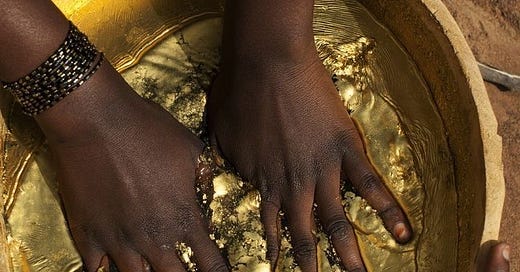



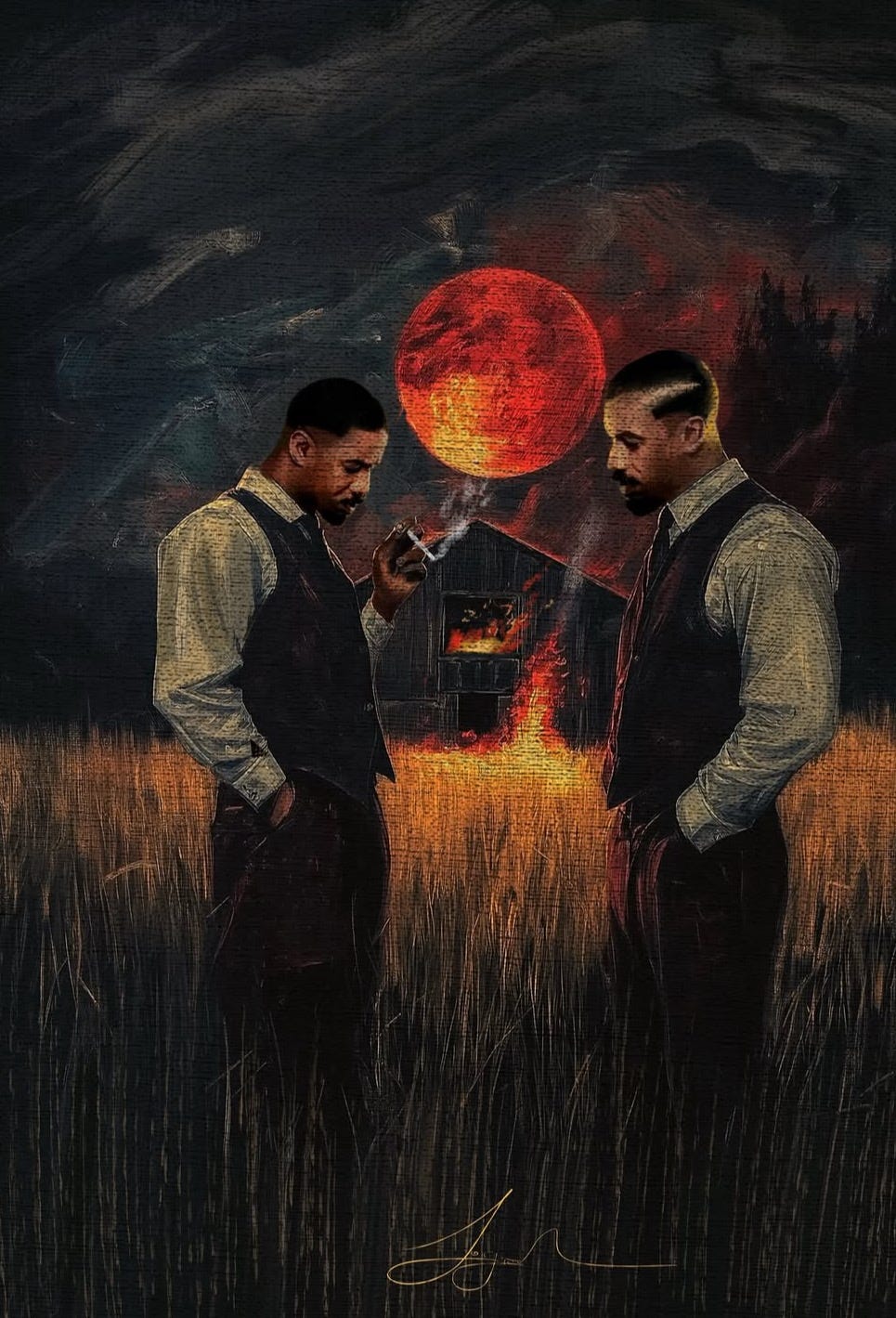
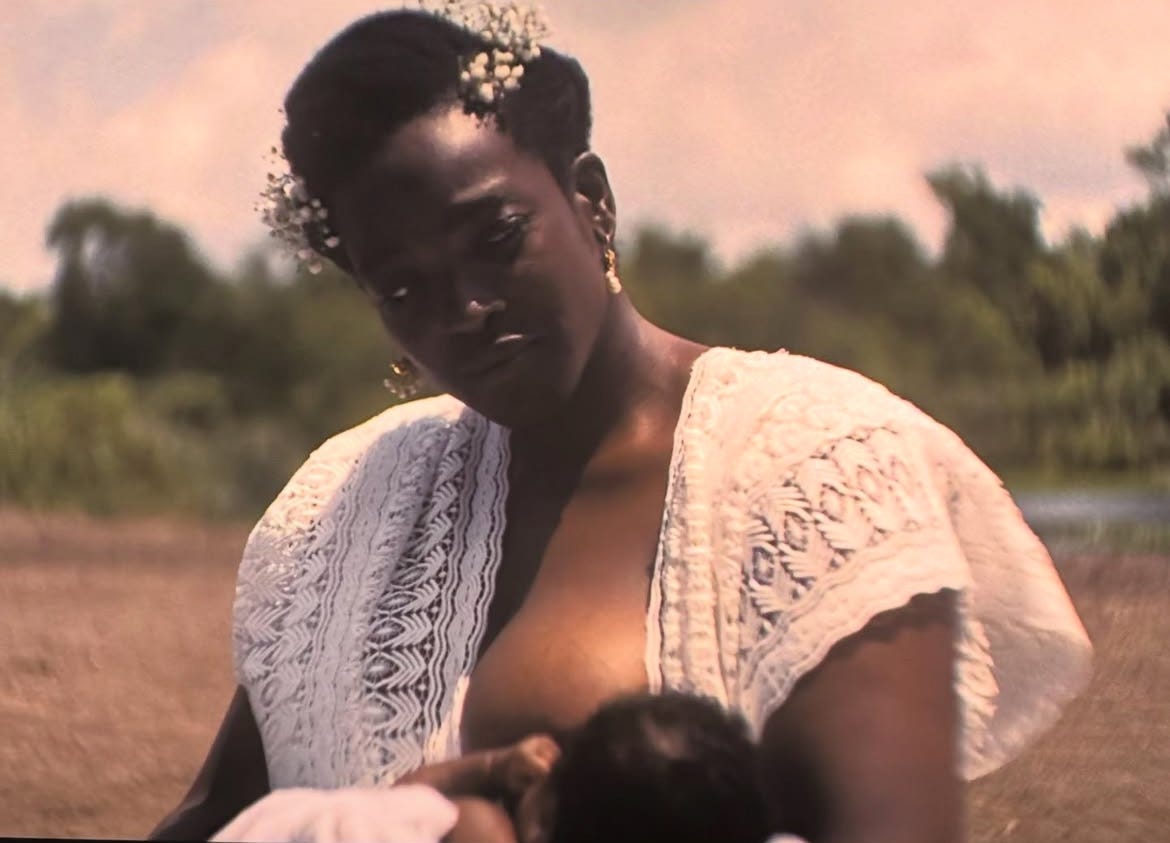
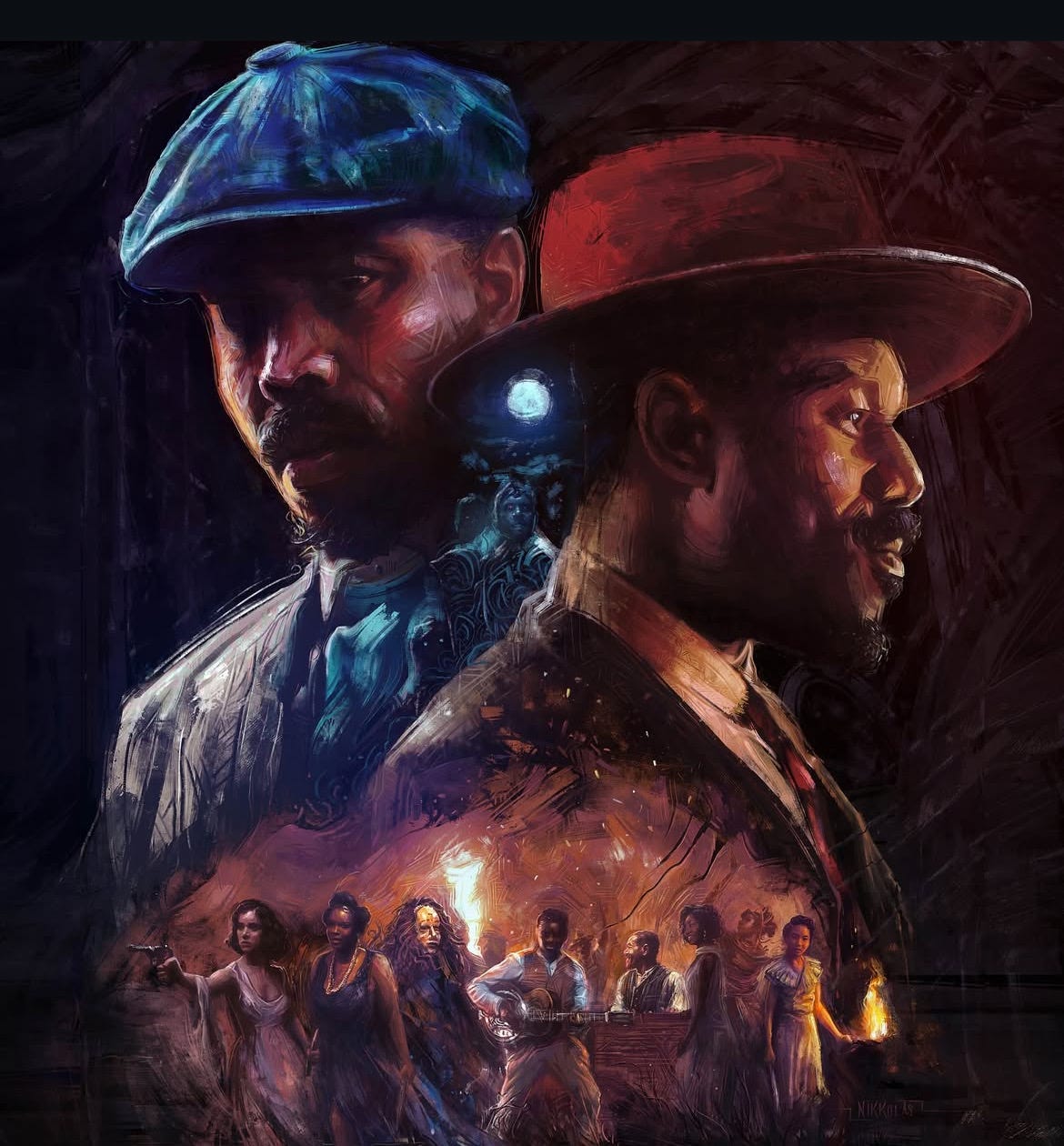
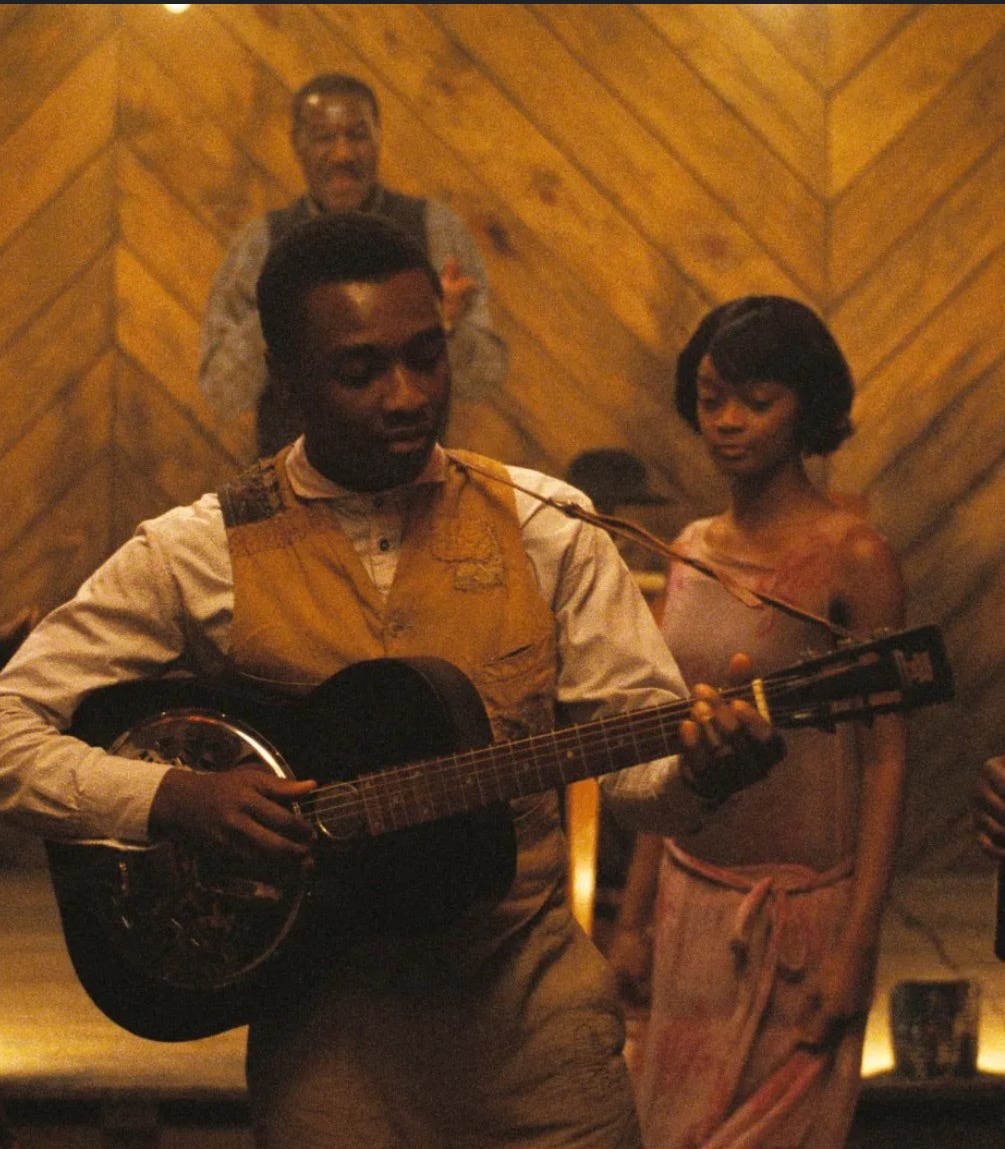
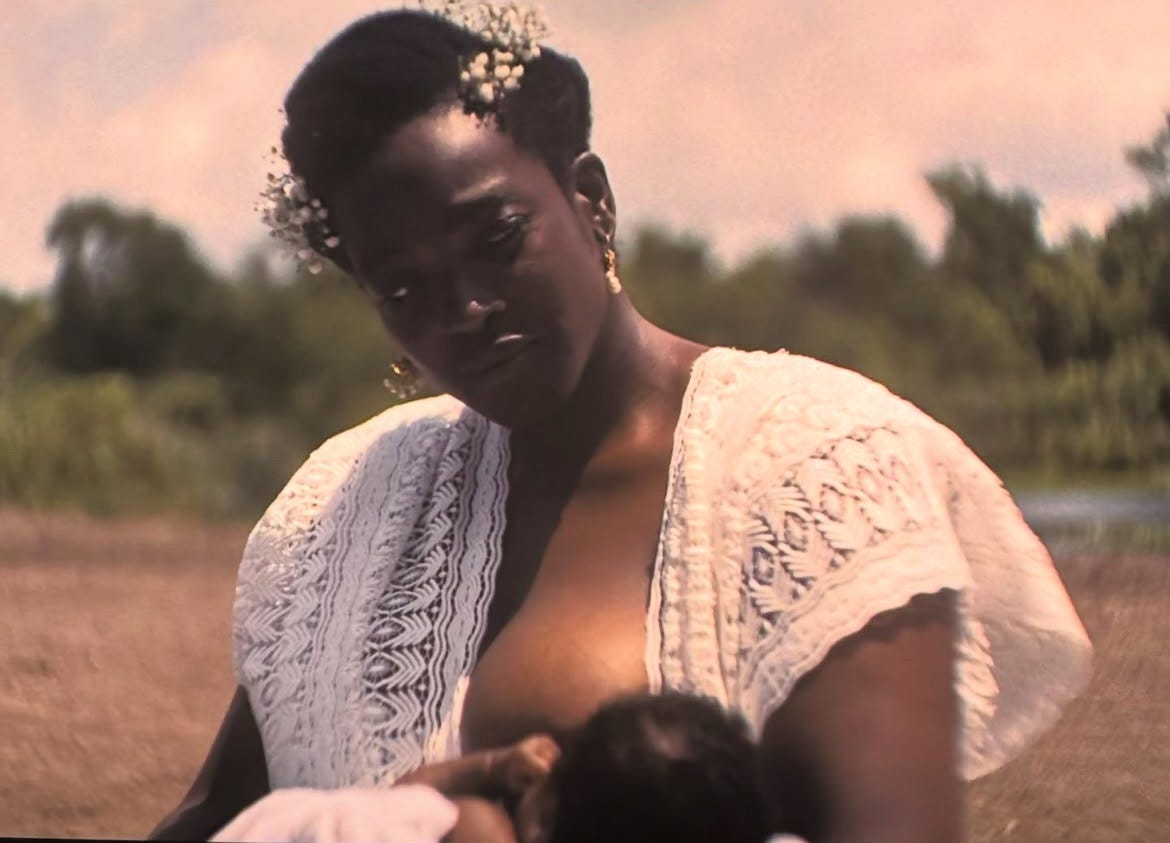
Dear Kira 👏🏾👏🏾👏🏾👏🏾👏🏾 first of all, because my goodness, as Jesus is the son of God, you WROTE THISSS! Wow!
I’ve read a couple of interesting pieces on Substack this morning but THIS..?? This is gold mama! ⭐️⭐️⭐️⭐️⭐️
Reading this felt painful, insightful, inspiring and encouraging. It’s a beautifully intelligent response the movie. Let me just stop by some quotes that did it for me:
“…even if they steal the fruit, the seed still belongs to you.”
- this is a sermon, a warning, a promise and a wake up call. We own what we own until we give it away believing that we have no power to hold it. The outsider will never know the name or origin of the seed unless we speak it.
- Lips sealed.
“…What part of myself is Smoke?
What part is Stack?
And who have I been feeding in order to stay seen?”
- profound questions that foster accountability practise which ultimately feeds self and communal preservation 👑
- If we cannot recognise ourselves well enough how can we truly represent ourselves and protect ourselves from others? We will inevitable end up calling ourselves by the names they give us. 🌱
“… Because we are givers. Lovers. Keepers of the eternal invitation. Even when we’re angry, we still set the table.”
- This hurt to read (especially as a black woman) because it is so true. Difficult also because it’s a part of me, of us that I love deeply and would hate to lose. I guess the lesson is to stay wise about the guests we choose to welcome. In my culture you do not call time on a visit. The guest stays for as long as they wish and you continue to serve and tend to them for the duration of their stay. The warmth of welcome does not expire; reason why we must be mindful of whom we invite to enter. It should only be those who would not abuse but choose in fact to honour and return the favour. Kinfolk in the spiritual sense.
This is such a beautiful peice! I love the way you chose to weave these strands together!